|
Two-dimensional illustrations related to TGD
inspired theory of conscious brain
Matti Pitkänen
Postal address:
Department of Physical Sciences, High Energy Physics Division, PL 64, FIN-00014,
University of Helsinki, Finland.
Home address:
Kadermonkatu 16, 10900, Hanko, Finland
E-mail:
matpitka@rock.helsinki.fi
URL-address:
http://www.physics.helsinki.fi/~matpitka
TGD inspired theory of conscious brain relies on assumption that the moments
of consciousness correspond to quantum jumps realized as jumps between
determistic quantum HISTORIES. Free will and nondeterminism are thus outside the
realm of geometrical spacetime and one avoids the wellknown difficulties
resulting from the attempt to understand the nondeterminism of quantum jump and
the determinism of Schrodinger equation in standard conceptual framework of
physical theories.
The hardware for conscious brain relies of various BE condensates made
possible by the special structure of TGD:eish spacetime. Crucial role is played
by the manysheeted nature of TGD:eish spacetime.
A. BE condensates of photons: quantum antenna hypothesis
One of the basic differences between induced gauge field concept and ordinary
is that it is possible to get classical em and Z0 fields propagating with the
velocity of light and with NONVANISHING vacuum gauge current: these solutiosn
are called 'MASSLESS EXTREMALS'. In Maxwell electrodynamics the solutions of
free Maxwell equations have vanishing sources (currents).
The vacuum currents in turn serve as sources of BE condensates. To each
Fourier mode there corresponds a coherent state of photons (eigenstate of photon
annihilation operator). Mathematically situation is identical to that with
harmonic oscillation in force F= A*x*cos(omega*t) for each Fourier mode.
Quantum antenna hypothesis states that linear structures such as
microtubules, DNA/etc. are associated with this kind of massless extremals
creating BE condensates of photons when vacuum current is nonvanishing. Vacuum
gauge current can be purely electromagnetic or Z^0 type or combination of these
two. Or all vacuum gauge currents vanish but there is electromagnetic wave
propagating with velocity of light: in this case no BE condensate is created.
The massless extremal property is destroyed by the presence of charges
creating Coulomb fields leading to Maxwell phase in which ordinary Maxwell
equations are excellent approximate description of situation in sufficiently
short length scales. Thus one should find a mechanism keeping the spacetime
sheet of massless extremal clean from charges.
The fact that microtubules and proteins are surrounded by ordered water
suggests the mechanism. There are two spacetime sheets essentially involved.
'Upper' (say) spacetime sheet contains ordered water, which is identified as
join along boundaries condensate of water molecules. The electric gauge flux
flows totally at this sheet and enters to the 'lower' spacetime sheet only at
the boundaries of the upper spacetime sheet through wormholes.
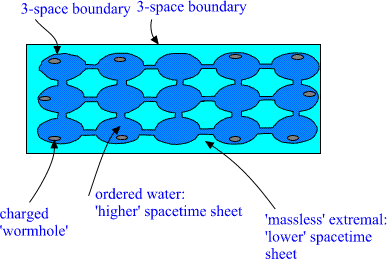
Fig. 23. Quantum antenna hypothesis
At the lower sheet massless extremals create BE condensate of photons. The
frequencies are multiples of pi/L, where L is the length of the microtubule or
any other linear structure. For microtubules the frequencies vary from IR to UV.
B. BE condensate of charged wormholes
The charged wormholes feeding the electromagnetic gauge flux from 'higher' to
'lower' spacetime sheet behave as classical charges as far as classical em
fields are considered and couple to photons extremely weakly. Their mass can be
estimated from p-adic length scale hypothesis to be of order 1/L(p), where p is
the p-adic prime associated with the 'lower' spacetime sheet; mass is very small
in biologically interesting length scales. For L(p) about 10^(-8) meters the
mass is about 10^2 eV: fraction 10^(-4) of electron mass.
Wormholes should behave like conduction electrons and thus concentrate on the
boundaries of 3-surfaces. Charged wormholes are described by complex order
parameter satisfying wave equation with very small mass. Thus one has energy
gap: for a system with size L the energy of the first excited state is of order
1/L. Therefore BE condensation to ground state occurs.
One can obtain macroscopic BE condensates by glueing smaller 3-surfaces by
join along boundaries bonds together. Good candidates are cells: now join along
boundaries bonds are gap junctions.
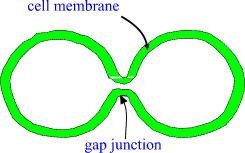
Fig. 24. Gap junctions connect certain cells and can make them macroscopic
quantum system.
Gap junction connecting two cells can be regarded as join along boundaries
bond. Cells could be glial cells in brain, cells in skin, glands, gut, heart
muscle fiber. For nerve cells gap junctions are rare. Nerve cells are connected
with glial cells in Ranvier nodes.
The proteins connecting microtubules (MAPs) can also be regarded as gap
junctions as well as proteins connecting different lipid layers of cell
membrane.
Wormhole condensate behaves very much like super conductor. In particular
Josephson junctions connecting two BE condensates are possible and Josephson
current of wormholes flows between these condensates. The model of nerve pulse
and EEG is based on assumption that the lipid layers of cell membrane are
wormhole BE condensates and that Josephson current flows along proteins
connecting the lipid layers. The situation is illustrated in the figure below.
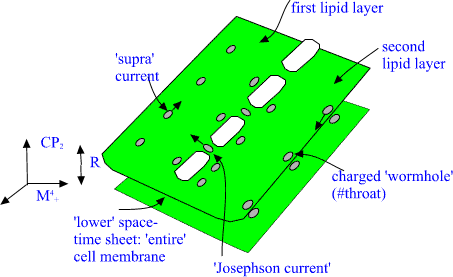
Fig. 25. The lipid layers of cell membrane as wormholes 'superconductors'
connected by 'Josephson junctions'. 2-dimensional visualization.
The model explains the difference between nerve cells and ordinary cells,
explains nerve pulse as soliton and frequency coding, explains EEG and predicts
new 'EG' type oscillation with frequency of order 10^10 Hz possibly coordinating
protein conformations as well as new ner pulse kind phenomenon with duration of
order 10^-10 seconds. The model is testable: for instance, the attribute
exhibitory/ inhibitory should be associated with nerve pulse (solitonic/antisolitonic)
rather with axon or synaptic connection.
C. Association sequences
In TGD inspired theory moments of consciousness correspond to quantum jumps.
The contents of consciousness is determined somehow by the comparison of initial
and final quantum histories. Essential point is that entire determistic quantum
histories are involved and without further assumptions it seems that
timelessness characterizes conscious experience. Thus the problem is how to
understand the concept of subjective time and finite duration of subjective
experience. Somehow the conscious experience is not localized to infinitely
short time interval but has finite duration, multilocality in time.
Second problem is to understand cognitive aspects of conscious experience.
Free will aspect is associated with any quantum jump, even that performed by
electron whereas cognitive aspects and thinking probably only to very
specialized quantum jumps. The concept of association sequence might provide a
solution of these problems.
The idea of association sequence is simply the following. In TGD there is no
reason to exclude 3-surfaces consisting of several disjoint 3-surfaces with time
like separations.
> 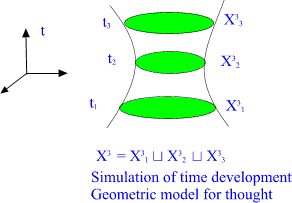
Fig. 26. 'Association sequence': a geometric model for thought as a sequence
of 3-surfaces with timelike separations.
It is tempting to identify this kind of 3-surfaces, with each 3-surface
belonging to an orbit of classical spacetime surface, as a simulation of the
classical history by snapshot pictures and thus as a geometric model for
thought. In introduced the name association sequence for these objects for long
time ago: my recent belief is that associations are more probably related to
quantum entanglement rather than 'association sequences' so that the choice for
name is not the best possible.
There is however a problem: General coordinate invariance implies that all
3-surfaces for which the absolute minimum spacetime surface is same, are
physically equivalent. In particular, association sequences in general are
expected to be physically equivalent with single spacetime surface in t=
constant plane of M^4_+.
There is a manner to overcome this difficulty based on CLASSICAL
NONDETERMINISM. There are good reasons to assume that Kahler action is not
completely deterministic. This means that in certain situations the absolute
minimum spacetime surface X^4(X^3) associated with 3-surface X^3 is not unique
but there are several of them. In this case on can fix a given branch only by
selecting finite number of 3-surfaces on the 'orbit' of X^3 besides X^3 itself.
In order to get rid of nonuniqueness of absolute minimum one can generalize the
concept of 3-surface by allowing association sequences! Thus thoughts emerge
naturally if classical theory is nondeterministic!
D. Association sequences as binary sequences
One can describe the situation also in following manner. Consider
nondetermistic dynamical evolution (also the spacetime surface can be regarded
as dynamical evolution of 3-surface X^3 and thus orbit in the space of
3-surfaces). Assume that bifurcations occur for time values t1,t2,...,tn , which
means that at these time values the orbits branches to two alternative branches.
There are 2^n possible orbits and one can specify these orbits uniquely by
selecting besides x(t), n points x(tau1), x(tau2),...x(taun). where tauk is
suitably chosen moment of time between two successive bifurcations.
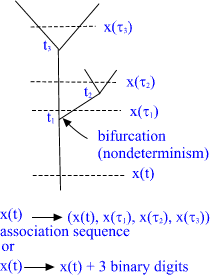
Fig. 27. Association sequence as sequence of bifurcations in presence of
classical nondeterminism.
This set of points defines association sequence. There is extremely tight
correlation between points x(tauk) to the extend that the association sequence
can be equivalently described by specifying x(t) and n binary digits telling
which alternative is realized in each bifurcation. Thus association sequences
can be regarded as BINARY SEQUENCES! Ideal representation if one has quantum
computer type operations in mind!
E. Criticality of Kahler action and nondeterminism
The vacuum degeneracy of Kahler action suggests strongly nondeterminism.
Consider a 'vacuum' 3-surface, which has vanishing induced Kahler field. There
is infinite number of vacuum extremals 'going through' this 3-surface. It is
plausible that the absolute minimum of Kahler action is obtained by slightly
deforming some of these vacuum extremals. Suppose this is the case.
There is enormous number of candidates for vacuum extremals: even their
topology can wildly vary. It can well happen for two 3-surfaces not differing
too much, the vacuum extremals giving rise to absolute minimum have different
topology or differ in some other qualitative aspect. Then there must exist some
3-surface between them for which the vacuum extremals with both these topologies
give absolute minimum with same value of action. Classical spacetime surface is
not unique in this case.
There is nice analogy with thermodynamical free energy and phase transitions.
Kähler action is just like free energy: spacetime surface corresponds to its
absolute minimum. In phase transition one has the situation described by cusp
catastrophe: see the figure below.

Fig. 28. Cusp catastrophe
At Maxwell line, where the phase transition occurs, both upper and lower
sheet give same value of free energy and state is mixture of two phases.
Elsewhere the phase is unique.
Biosystems, or systems with cognitive abilities would be thus critical
systems, for which absolute minimum of effective actions (whose bosonic part is
just Kahler action) have degenerate absolute minima.
F. Thoughts and vacuum extremals
Here is a receipe for constructing geometric model for thought. Take vacuum
extremal with a definite duration of time: vacuum spacetime surface begins at t1
and ends at t2. This surface behaves completely nondeterministically apart from
the restriction coming from vacuum property. Thus it can be regarded as a model
for completely free imagination. It need not be an absolute minimum of effective
action.

Fig. 29. Nondetermistic vacuum extremals as model for free imagination
To construct a model of thought, let this kind of vacuum spacetime surface
interact with matter. That is, join this surface to spacetime surface containing
matter with # throats (wormholes). Some energy flows to vacuum surface and
deforms it: it ceases to be vacuum. For certain deformation(s) absolute minimum
of Kahler action is achieved: typically Kahler electric fields are generated to
minimize Kahler action.
What is essential that INTERACTION WITH EXTERNAL WORLD CODES SOME PROPERTIES
OF THE EXTERNAL WORLD TO THE PROPERTIES OF THE DEFORMED VACUUM: some features of
the external world is represented as properties of deformed vacuum. This is what
cognitive systems do all the time: they construct representations.
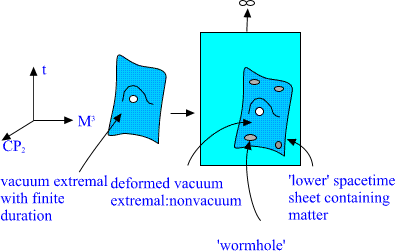
Fig. 30. Interaction with matter forms a representation of external world in
the properties of vacuum extremal. There are several deformed vacuum extremals
with same absolute minimum of effective action.
This procedure can be repeated for any vacuum surface. It can however happen
that absolute minimum value of effective action is same for several choices of
vacuum extremal. Thus effective spacetime surface is not unique but degenerate
and one has classical nondeterminism. This in turn implies that one must form
quantum superpositions of effective spacetimes and quantum jump selecting one
spacetime from this superposition generates conscious thought. By putting vacuum
extremal of finite duration above spacetime sheet containing matter one obtains
a representation for a small sample of time development as conscious experience.
More concretely. Put vacuum extremal of finite duration 'above' a group of
neurons. The syncronous periodic firing of nerve pulses for this group of
neurons could form a representation of sensory data in the properties of vacuum
extremal. There is indeed some evidence that this kind of mechanism is at work:
both the spatial configuration of nerve pulses and the organization of pulse
sequences in time direction seem to be code sensory experience. Roughly:
spacetime is divided into 4-volumes: each 4-volume contains nerve cell and has
nerve pulse duration. To each small volume one associates binary digit according
to whether the neuron fired or not. Each nerve pulse could cause bifurcation and
the time distance between surfaces of association sequence would correspond to
the period between nerve pulses. EEG oscillations of glial neurons forming
macroscopic quantum system would in turn coordinate the firing of neurons to
occur synchronously.
A second argument for the degeneracy of absolute minimum. Suppose an absolute
minimum of effective action has been found. Call it X^4. Replace this surface
with a new surface, which is disjoint union of X^4 and of some vacuum spacetime
surface having vanishing Kahler action. Also this surface is absolute minimum!
Does this mean that the each minimum of the effective action is infinitely
degenerate? Is it possible to pose some conditions on the physical state
eliminating this kind of degeneracy? Or should one just accept this degeneracy
as a prediction of TGD. Is this free imagination aspect always present in
quantum state?
Note: the vacuum surfaces are very much like vacuum bubbles of quantum field
theory appearing in any Feynmann diagrams and not actually contributing to
scattering amplitude.
Additional Illustrations
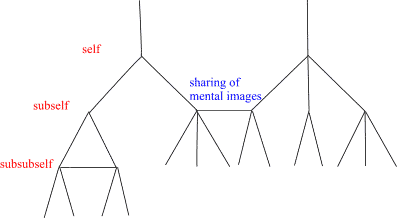
The most general structure of the self hierarchy is fixed by
the requirement that subself cannot have self
as subself. This allows horizontal connection between selves at the same level
of the hierarchy giving rise to sharing and fusion of mental images.

The classical non-determinism of Kahler action forces one to
generalize the notion of 3-surface by allowing sequences of space-like
3-surfaces with time-like separations. These sequences have interpretation as
linguistic expressions providing a representation for quantum jump sequence
defining the contents of a self's consciousness
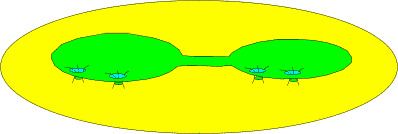
Illustration of wormhole contacts (size order of elementary
particle) and join-along boundary bond
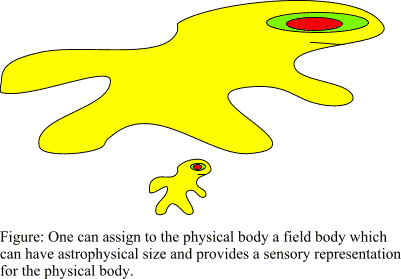

MEs can serve as bridges between various spacetime sheets.
This induces a leakage of the supra currents from magnetic flux tubes (k=169) to
the atomic space-time sheets (k=137) and vice versa. Also the time reversal of
this process can occur (k=151 denotes cell membrane spacetime sheet).
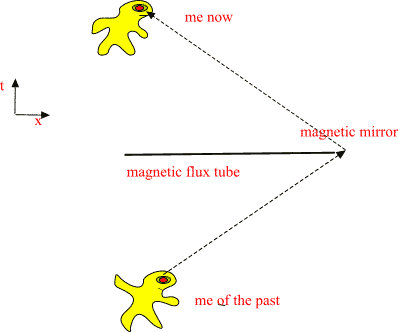
Mirror mechanism of memory. To remember is to look at magnetic
mirror over a distance of light years.
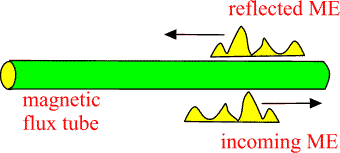
The ends of the magnetic flux tube can act as mirrors at which
topological light rays (MEs) are reflected. Oscillations of magnetic flux tube
can also amplify the signals carried by MEs.
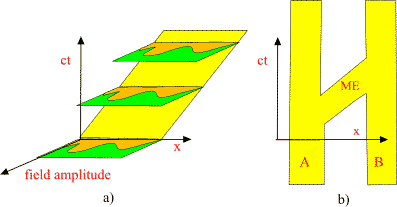
a. 2-dimensional spacetime illustration of topological light
ray (massless extremal, ME). Field pattern propagates with light velocity
preserving its shape.
b. MEs serve as field bridges between spacetime sheets and
make possible both classical and quantum communications.
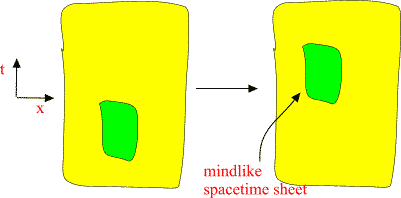
The simplest manner to understand psychological time is as the
center of mass temporal coordinate for a mindlike spacetime sheet. The arrow of
psychological time results from the drift of the mindlike spacetime sheet to the
direction of future induced by the geometry of the future lightcone.
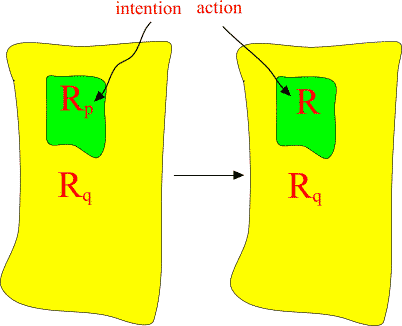
The transformation of intention to action corresponds to a
quantum jump in which p-adic spacetime region is transformed to real one.
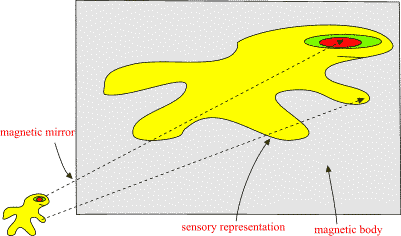
Magnetic mirrors (topological light rays associated with
magnetic flux tubes) act as sensory projectors from brain (and body) to magnetic
body acting as sensory canvas.
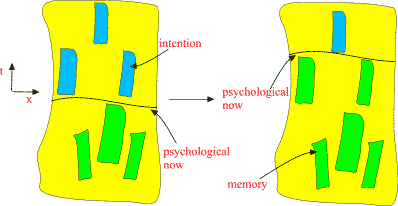
Psychological now corresponds to the phase transition front:
p-adic spacetime regions (blue) representing intentions are transformed to real
spacetime regions representing actions and memories (green).
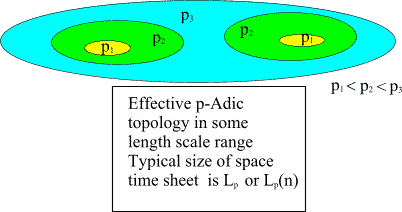
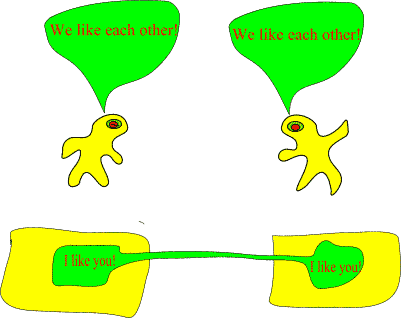
Fusion and sharing of mental images occurs if subselves
(mental images) of two selves entangle to form a more complex 'stereo' mental
image. This is not possible without length scale dependent notion of subsystem.
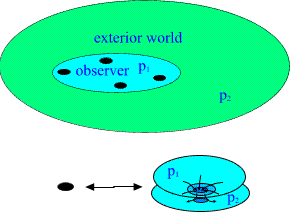
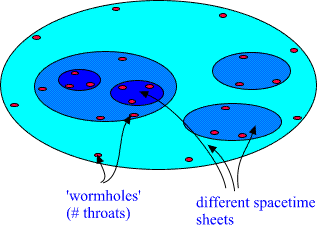
| 